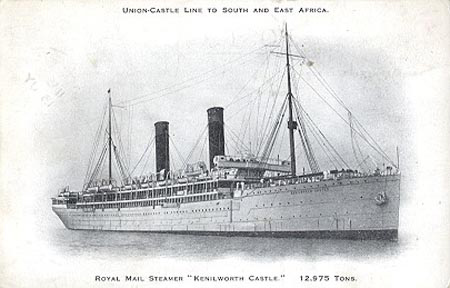England to India in Two Months : (1)
In recent years, I have been leaving quite a 'paper trail' behind me. Here on 'A Story A Week', in the newsletter that I write for my print subscribers, and in the 'Essays' section of my website, I'm constantly chatting about various things that happen to me. As a result of all this 'storytelling', people in years to come - I'm thinking of grandchildren - will perhaps have quite a good idea of what my life was like.
I find myself wishing that some of my own ancestors had done the same thing, so that I could 'get to know them' at least a little bit. Earlier this summer, when I was visiting my folks over in Vancouver, I got a chance to do just that, when my mother gave me a photocopy of a small journal prepared by her step-father back in 1917, during the First World War. He was a private in the British Army, and this 20-page journal, describing his journey from England to India on a troopship, makes fascinating reading. Let's dip into it this week and next with a few excerpts ...
"... on Sunday the 18th the anchor was drawn at 7-30 p.m. and our long journey had commenced. We watched the shores of Old England until they were out of sight, and then turned in for the night, but it was a bit rough and we were swinging to and fro in our hammocks, all through the night."
Their ship - the Kenilworth Castle - was a passenger liner commandeered by the government, and was carrying 1500 soldiers and 400 sailors, plus the ship's crew. There was an extreme danger of being torpedoed by German submarines, so their convoy took evasive routes as they headed south down the west side of Africa.
"... very pleasant sailing. It was very hot and we had to start casting our clothes. ... Early morning 4 o'clock we had a bath in salt water on the Deck, then back to breakfast ... Also on this day we started walking about with our feet bare, something I have never done before, but nobody can see us."
The first part of their journey - England to Cape Town - took exactly four weeks, so it was important for them to create their own entertainment on board:
"... we started the sports in which all the different regiments on board took part. ... We had also tug of war, sack races, and cock fighting contests during the day."
They made one port stop on the way to South Africa, at Sierra Leone, to take on food, including fresh fruit:
"... the native dealers were sending small boats loaded with fruit to the ships ... We had a bit of fun with the natives who came round our ship, having them diving into the water for coins that were thrown in, and they hardly ever missed them."
There were many ships in the convoy, and with so many people on board, for such a long time, it was inevitable that there would be quite a few events like this:
"This morning one of the ships left us and went some distance away, then hoisted the flag at half mast, so we found out that it was a burial at sea ... We had another funeral yesterday, making the sixth on our journey. ... we had to take all our kit and belongings on to the deck, until the ship's crew disinfected the lower decks, as there were one or two cases of disease found."
After arriving at Cape Town, they were allowed some shore leave. What did they do after being cooped up on board ship for four weeks?
"We could go where we liked only we had to be back at a certain time. Well I and 3 others wandered into the rose gardens where there were all kinds of rose trees, and stayed there about 1/2 an hour. Then we fell in again and were marched back to the ship to dinner."
But I wonder if that was perhaps all he felt able to write, in a journal that he planned to be sending home to his wife later!
We'll read a few more excerpts next week; the next section of his journey was not as calm as the first leg!
Story #101, December 2 2007


